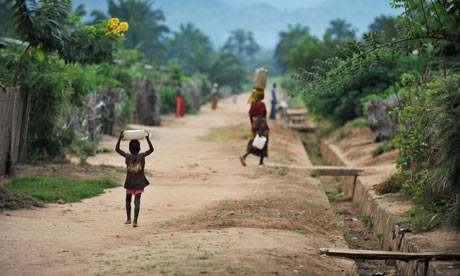
What lessons can foreign aid take from post-genocide Burundi? This is not the question that Tracy Kidder's Pulitzer Prize winning novel asks, but within the narrative of Strength in What Remains there are important lessons in development effectiveness. The hero, Tutsi medical student Deogratias Niyizonkiza (Deo) , survives the genocides of 1993, and then homelessness and isolation in New York city. For Deo, a recovery from the trauma of his past has fueled his unrelenting pursuit of his childhood mission to build a village medical clinic in regional Burundi. His story is riveting and profoundly moving and the success of the clinic – the Village Health Works – is among its most rewarding aspects.
Though haunted by nightmares and sleeping rough in New York City, Deo meets a number of kind strangers who give him shelter, kindness, and access to what he says will heal him most – books. Eventually he gains entry to pre-medical studies at Columbia University and medical studies at Duke. His recovery is a long and wrenching process. Kidder's attempts to render it accessible to the reader make for difficult, though compelling, reading. Ultimately Kidder admits that he cannot follow Deo emotionally into the "place beyond horror" to which Deo returns as he confronts his past, and in this sense we are at least partly relieved of that journey.
Deo has harboured a childhood ambition, and this is what saves him. As a boy, Deo had watched his best friend Clovis die suddenly of malaria, and had prayed for some magic to "get his friend back to life". The prayer stayed with him, and for successive summers as he completed high school, Deo convinced friends to help him make mud bricks for a medical clinic he was determined to build. It would be sixteen years before he succeeded, and in the meantime he would survive a massacre at the very teaching hospital he attended as a medical student.
Why does Deo succeed where many others have failed, including a European Church-funded clinic nearby? Deo doesn't need lessons from international organisations about sustainability, local ownership, gender and capacity building. He gains the support of the village early on, including continuing efforts to make the bricks for the clinic's buildings. As his plans gain momentum Deo creates a separate committee for women when he sees the latter's skill in determining village health and therefore clinic priorities. An international infrastructure company tells him it will cost US$50,000 to open up the clinic's access road. In response, 166 impoverished Hutu locals donate their labour and tools - mostly shovels, pickaxes and machetes – for the six weeks it takes to widen the road. One works while carrying a feverish baby, who will die because there is no medical care in the village, in the hope that the road will save her next one.
This is not just a village effort: there is significant international expertise involved. However it is of note that the foreign aid links into this village health project are mostly created by Deo himself, with the continuing mentorship of his US mentor Paul Farmer, a physician and anthropologist. Deo had tracked Farmer down after reading one of his textbooks on poverty and medicine, and had interned in Rwanda with his NGO Partners in Health.
Now Deo's mentor, Farmer gathers a group of NGOs who work together to provide solar-powered electricity, a generator and fuel in the meantime, and computers and a satellite system so the clinic can maintain records. Farmer also negotiates access from national and international health authorities to inexpensive supplies and medicines, including free HIV and TB drugs. Deo brings with him friends from medical school, one of whom will later return to run the clinic on a volunteer basis.
The clinic's website lists its core beliefs: grassroots (led and driven by the community), holistic, results-driven, collaborative, scalable. Not the kind of thing that a donor can put their flag all over, and revolutionary in terms of poverty reduction and village health.
Marianne Jago-Bassingthwaighte is lecturer and research fellow at James Cook University's Centre for Disaster Studies
Views and reviews is a weekly space to share the correspondence we get from our readers and also for our members to tell us what global development books you are reading. Sign up here to become a member.

